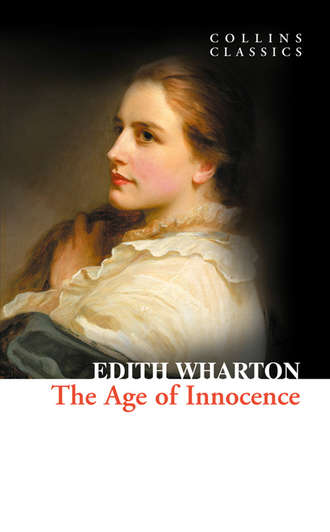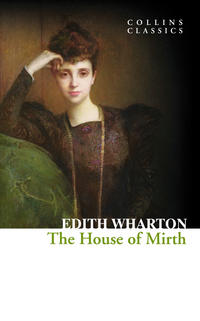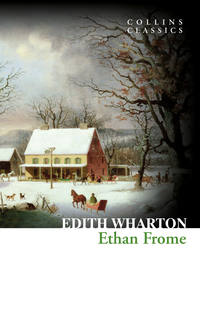
Полная версия
The Age of Innocence
“But you’ll explain these things to me—you’ll tell me all I ought to know,” Madame Olenska continued, leaning forward to hand him his cup.
“It’s you who are telling me; opening my eyes to things I’d looked at so long that I’d ceased to see them.”
She detached a small gold cigarette-case from one of her bracelets, held it out to him, and took a cigarette herself. On the chimney were long spills for lighting them.
“Ah, then we can both help each other. But I want help so much more. You must tell me just what to do.”
It was on the tip of his tongue to reply: “Don’t be seen driving about the streets with Beaufort—” but he was being too deeply drawn into the atmosphere of the room, which was her atmosphere, and to give advice of that sort would have been like telling some one who was bargaining for attar-of-roses in Samarkand that one should always be provided with arctics for a New York winter. New York seemed much farther off than Samarkand, and if they were indeed to help each other she was rendering what might prove the first of their mutual services by making him look at his native city objectively. Viewed thus, as through the wrong end of a telescope, it looked disconcertingly small and distant; but then from Samarkand it would.
A flame darted from the logs and she bent over the fire, stretching her thin hands so close to it that a faint halo shone about the oval nails. The light touched to russet the rings of dark hair escaping from her braids, and made her pale face paler.
“There are plenty of people to tell you what to do,” Archer rejoined, obscurely envious of them.
“Oh—all my aunts? And my dear old Granny?” She considered the idea impartially. “They’re all a little vexed with me for setting up for myself—poor Granny especially. She wanted to keep me with her; but I had to be free—” He was impressed by this light way of speaking of the formidable Catherine, and moved by the thought of what must have given Madame Olenska this thirst for even the loneliest kind of freedom. But the idea of Beaufort gnawed him.
“I think I understand how you feel,” he said. “Still, your family can advise you; explain differences; show you the way.”
She lifted her thin black eyebrows. “Is New York such a labyrinth? I thought it so straight up and down—like Fifth Avenue. And with all the cross streets numbered!” She seemed to guess his faint disapproval of this, and added, with the rare smile that enchanted her whole face: “If you knew how I like it for just that— the straight-up-and-downness, and the big honest labels on everything!”
He saw his chance. “Everything may be labelled—but everybody is not.”
“Perhaps. I may simplify too much—but you’ll warn me if I do.” She turned from the fire to look at him. “There are only two people here who make me feel as if they understood what I mean and could explain things to me: you and Mr. Beaufort.”
Archer winced at the joining of the names, and then, with a quick readjustment, understood, sympathised and pitied. So close to the powers of evil she must have lived that she still breathed more freely in their air. But since she felt that he understood her also, his business would be to make her see Beaufort as he really was, with all he represented—and abhor it.
He answered gently: “I understand. But just at first don’t let go of your old friends’ hands: I mean the older women, your Granny Mingott, Mrs. Welland, Mrs. van der Luyden. They like and admire you—they want to help you.”
She shook her head and sighed. “Oh, I know—I know! But on condition that they don’t hear anything unpleasant. Aunt Welland put it in those very words when I tried. . . . Does no one want to know the truth here, Mr. Archer? The real loneliness is living among all these kind people who only ask one to pretend!” She lifted her hands to her face, and he saw her thin shoulders shaken by a sob.
“Madame Olenska!—Oh, don’t, Ellen,” he cried, starting up and bending over her. He drew down one of her hands, clasping and chafing it like a child’s while he murmured reassuring words; but in a moment she freed herself, and looked up at him with wet lashes.
“Does no one cry here, either? I suppose there’s no need to, in heaven,” she said, straightening her loosened braids with a laugh, and bending over the tea-kettle. It was burnt into his consciousness that he had called her “Ellen”—called her so twice; and that she had not noticed it. Far down the inverted telescope he saw the faint white figure of May Welland—in New York.
Suddenly Nastasia put her head in to say something in her rich Italian.
Madame Olenska, again with a hand at her hair, uttered an exclamation of assent—a flashing “Già—già”—and the Duke of St. Austrey entered, piloting a tremendous black-wigged and red-plumed lady in overflowing furs.
“My dear Countess, I’ve brought an old friend of mine to see you—Mrs. Struthers. She wasn’t asked to the party last night, and she wants to know you.”
The Duke beamed on the group, and Madame Olenska advanced with a murmur of welcome toward the queer couple. She seemed to have no idea how oddly matched they were, nor what a liberty the Duke had taken in bringing his companion—and to do him justice, as Archer perceived, the Duke seemed as unaware of it himself.
“Of course I want to know you, my dear,” cried Mrs. Struthers in a round rolling voice that matched her bold feathers and her brazen wig. “I want to know everybody who’s young and interesting and charming. And the Duke tells me you like music—didn’t you, Duke? You’re a pianist yourself, I believe? Well, do you want to hear Joachim play tomorrow evening at my house? You know I’ve something going on every Sunday evening—it’s the day when New York doesn’t know what to do with itself, and so I say to it: ‘Come and be amused.’ And the Duke thought you’d be tempted by Joachim. You’ll find a number of your friends.”
Madame Olenska’s face grew brilliant with pleasure. “How kind! How good of the Duke to think of me!” She pushed a chair up to the tea-table and Mrs. Struthers sank into it delectably. “Of course I shall be too happy to come.”
“That’s all right, my dear. And bring your young gentleman with you.” Mrs. Struthers extended a hail-fellow hand to Archer. “I can’t put a name to you—but I’m sure I’ve met you—I’ve met everybody, here, or in Paris or London. Aren’t you in diplomacy? All the diplomatists come to me. You like music too? Duke, you must be sure to bring him.”
The Duke said “Rather” from the depths of his beard, and Archer withdrew with a stiffly circular bow that made him feel as full of spine as a self-conscious school-boy among careless and unnoticing elders.
He was not sorry for the dénouement of his visit: he only wished it had come sooner, and spared him a certain waste of emotion. As he went out into the wintry night, New York again became vast and imminent, and May Welland the loveliest woman in it. He turned into his florist’s to send her the daily box of lilies-of-the-valley which, to his confusion, he found he had forgotten that morning.
As he wrote a word on his card and waited for an envelope he glanced about the embowered shop, and his eye lit on a cluster of yellow roses. He had never seen any as sun-golden before, and his first impulse was to send them to May instead of the lilies. But they did not look like her—there was something too rich, too strong, in their fiery beauty. In a sudden revulsion of mood, and almost without knowing what he did, he signed to the florist to lay the roses in another long box, and slipped his card into a second envelope, on which he wrote the name of the Countess Olenska; then, just as he was turning away, he drew the card out again, and left the empty envelope on the box.
“They’ll go at once?” he enquired, pointing to the roses.
The florist assured him that they would.
Chapter 10
The next day he persuaded May to escape for a walk in the Park after luncheon. As was the custom in old-fashioned Episcopalian New York, she usually accompanied her parents to church on Sunday afternoons; but Mrs. Welland condoned her truancy, having that very morning won her over to the necessity of a long engagement, with time to prepare a hand-embroidered trousseau containing the proper number of dozens.
The day was delectable. The bare vaulting of trees along the Mall was ceiled with lapis lazuli, and arched above snow that shone like splintered crystals. It was the weather to call out May’s radiance, and she burned like a young maple in the frost. Archer was proud of the glances turned on her, and the simple joy of possessorship cleared away his underlying perplexities.
“It’s so delicious—waking every morning to smell lilies-of-the-valley in one’s room!” she said.
“Yesterday they came late. I hadn’t time in the morning—”
“But your remembering each day to send them makes me love them so much more than if you’d given a standing order, and they came every morning on the minute, like one’s music-teacher—as I know Gertrude Lefferts’s did, for instance, when she and Lawrence were engaged.”
“Ah—they would!” laughed Archer, amused at her keenness. He looked sideways at her fruit-like cheek and felt rich and secure enough to add: “When I sent your lilies yesterday afternoon I saw some rather gorgeous yellow roses and packed them off to Madame Olenska. Was that right?”
“How dear of you! Anything of that kind delights her. It’s odd she didn’t mention it: she lunched with us today, and spoke of Mr. Beaufort’s having sent her wonderful orchids, and cousin Henry van der Luyden a whole hamper of carnations from Skuytercliff. She seems so surprised to receive flowers. Don’t people send them in Europe? She thinks it such a pretty custom.”
“Oh, well, no wonder mine were overshadowed by Beaufort’s,” said Archer irritably. Then he remembered that he had not put a card with the roses, and was vexed at having spoken of them. He wanted to say: “I called on your cousin yesterday,” but hesitated. If Madame Olenska had not spoken of his visit it might seem awkward that he should. Yet not to do so gave the affair an air of mystery that he disliked. To shake off the question he began to talk of their own plans, their future, and Mrs. Welland’s insistence on a long engagement.
“If you call it long! Isabel Chivers and Reggie were engaged for two years: Grace and Thorley for nearly a year and a half. Why aren’t we very well off as we are?”
It was the traditional maidenly interrogation, and he felt ashamed of himself for finding it singularly childish. No doubt she simply echoed what was said to her; but she was nearing her twenty-second birthday, and he wondered at what age “nice” women began to speak for themselves.
“Never, if we won’t let them, I suppose,” he mused, and recalled his mad outburst to Mr. Sillerton Jackson: “Women ought to be as free as we are—”
It would presently be his task to take the bandage from this young woman’s eyes, and bid her look forth on the world. But how many generations of the women who had gone to her making had descended bandaged to the family vault? He shivered a little, remembering some of the new ideas in his scientific books, and the much-cited instance of the Kentucky cave-fish, which had ceased to develop eyes because they had no use for them. What if, when he had bidden May Welland to open hers, they could only look out blankly at blankness?
“We might be much better off. We might be altogether together—we might travel.”
Her face lit up. “That would be lovely,” she owned: she would love to travel. But her mother would not understand their wanting to do things so differently.
“As if the mere ‘differently’ didn’t account for it!” the wooer insisted.
“Newland! You’re so original!” she exulted.
His heart sank, for he saw that he was saying all the things that young men in the same situation were expected to say, and that she was making the answers that instinct and tradition taught her to make—even to the point of calling him original.
“Original! We’re all as like each other as those dolls cut out of the same folded paper. We’re like patterns stencilled on a wall. Can’t you and I strike out for ourselves, May?”
He had stopped and faced her in the excitement of their discussion, and her eyes rested on him with a bright unclouded admiration.
“Mercy—shall we elope?” she laughed.
“If you would—”
“You do love me, Newland! I’m so happy.”
“But then—why not be happier?”
“We can’t behave like people in novels, though, can we?”
“Why not—why not—why not?”
She looked a little bored by his insistence. She knew very well that they couldn’t, but it was troublesome to have to produce a reason. “I’m not clever enough to argue with you. But that kind of thing is rather—vulgar, isn’t it?” she suggested, relieved to have hit on a word that would assuredly extinguish the whole subject.
“Are you so much afraid, then, of being vulgar?”
She was evidently staggered by this. “Of course I should hate it—so would you,” she rejoined, a trifle irritably.
He stood silent, beating his stick nervously against his boot-top; and feeling that she had indeed found the right way of closing the discussion, she went on light-heartedly: “Oh, did I tell you that I showed Ellen my ring? She thinks it the most beautiful setting she ever saw. There’s nothing like it in the rue de la Paix, she said. I do love you, Newland, for being so artistic!”
The next afternoon, as Archer, before dinner, sat smoking sullenly in his study, Janey wandered in on him. He had failed to stop at his club on the way up from the office where he exercised the profession of the law in the leisurely manner common to well-to-do New Yorkers of his class. He was out of spirits and slightly out of temper, and a haunting horror of doing the same thing every day at the same hour besieged his brain.
“Sameness—sameness!” he muttered, the word running through his head like a persecuting tune as he saw the familiar tall-hatted figures lounging behind the plate-glass; and because he usually dropped in at the club at that hour he had gone home instead. He knew not only what they were likely to be talking about, but the part each one would take in the discussion. The Duke of course would be their principal theme; though the appearance in Fifth Avenue of a golden-haired lady in a small canary-coloured brougham with a pair of black cobs (for which Beaufort was generally thought responsible) would also doubtless be thoroughly gone into. Such “women” (as they were called) were few in New York, those driving their own carriages still fewer, and the appearance of Miss Fanny Ring in Fifth Avenue at the fashionable hour had profoundly agitated society. Only the day before, her carriage had passed Mrs. Lovell Mingott’s, and the latter had instantly rung the little bell at her elbow and ordered the coachman to drive her home. “What if it had happened to Mrs. van der Luyden?” people asked each other with a shudder. Archer could hear Lawrence Lefferts, at that very hour, holding forth on the disintegration of society.
He raised his head irritably when his sister Janey entered, and then quickly bent over his book (Swinburne’s “Chastelard”—just out) as if he had not seen her. She glanced at the writing-table heaped with books, opened a volume of the “Contes Drôlatiques,” made a wry face over the archaic French, and sighed: “What learned things you read!”
“Well—?” he asked, as she hovered Cassandra-like before him.
“Mother’s very angry.”
“Angry? With whom? About what?”
“Miss Sophy Jackson has just been here. She brought word that her brother would come in after dinner: she couldn’t say very much, because he forbade her to: he wishes to give all the details himself. He’s with cousin Louisa van der Luyden now.”
“For heaven’s sake, my dear girl, try a fresh start. It would take an omniscient Deity to know what you’re talking about.”
“It’s not a time to be profane, Newland. . . . Mother feels badly enough about your not going to church . . .”
With a groan he plunged back into his book.
“Newland! Do listen. Your friend Madame Olenska was at Mrs. Lemuel Struthers’s party last night: she went there with the Duke and Mr. Beaufort.”
At the last clause of this announcement a senseless anger swelled the young man’s breast. To smother it he laughed. “Well, what of it? I knew she meant to.”
Janey paled and her eyes began to project. “You knew she meant to—and you didn’t try to stop her? To warn her?”
“Stop her? Warn her?” He laughed again. “I’m not engaged to be married to the Countess Olenska!” The words had a fantastic sound in his own ears.
“You’re marrying into her family.”
“Oh, family—family!” he jeered.
“Newland—don’t you care about Family?”
“Not a brass farthing.”
“Nor about what cousin Louisa van der Luyden will think?”
“Not the half of one—if she thinks such old maid’s rubbish.”
“Mother is not an old maid,” said his virgin sister with pinched lips.
He felt like shouting back: “Yes, she is, and so are the van der Luydens, and so we all are, when it comes to being so much as brushed by the wing-tip of Reality.” But he saw her long gentle face puckering into tears, and felt ashamed of the useless pain he was inflicting.
“Hang Countess Olenska! Don’t be a goose, Janey—I’m not her keeper.”
“No; but you did ask the Wellands to announce your engagement sooner so that we might all back her up; and if it hadn’t been for that cousin Louisa would never have invited her to the dinner for the Duke.”
“Well—what harm was there in inviting her? She was the best-looking woman in the room; she made the dinner a little less funereal than the usual van der Luyden banquet.”
“You know cousin Henry asked her to please you: he persuaded cousin Louisa. And now they’re so upset that they’re going back to Skuytercliff tomorrow. I think, Newland, you’d better come down. You don’t seem to understand how mother feels.”
In the drawing-room Newland found his mother. She raised a troubled brow from her needlework to ask: “Has Janey told you?”
“Yes.” He tried to keep his tone as measured as her own. “But I can’t take it very seriously.”
“Not the fact of having offended cousin Louisa and cousin Henry?”
“The fact that they can be offended by such a trifle as Countess Olenska’s going to the house of a woman they consider common.”
“Consider—!”
“Well, who is; but who has good music, and amuses people on Sunday evenings, when the whole of New York is dying of inanition.”
“Good music? All I know is, there was a woman who got up on a table and sang the things they sing at the places you go to in Paris. There was smoking and champagne.”
“Well—that kind of thing happens in other places, and the world still goes on.”
“I don’t suppose, dear, you’re really defending the French Sunday?”
“I’ve heard you often enough, mother, grumble at the English Sunday when we’ve been in London.”
“New York is neither Paris nor London.”
“Oh, no, it’s not!” her son groaned.
“You mean, I suppose, that society here is not as brilliant? You’re right, I daresay; but we belong here, and people should respect our ways when they come among us. Ellen Olenska especially: she came back to get away from the kind of life people lead in brilliant societies.”
Newland made no answer, and after a moment his mother ventured: “I was going to put on my bonnet and ask you to take me to see cousin Louisa for a moment before dinner.” He frowned, and she continued: “I thought you might explain to her what you’ve just said: that society abroad is different . . . that people are not as particu -lar, and that Madame Olenska may not have realised how we feel about such things. It would be, you know, dear,” she added with an innocent adroitness, “in Madame Olenska’s interest if you did.”
“Dearest mother, I really don’t see how we’re concerned in the matter. The Duke took Madame Olenska to Mrs. Struthers’s— in fact he brought Mrs. Struthers to call on her. I was there when they came. If the van der Luydens want to quarrel with anybody, the real culprit is under their own roof.”
“Quarrel? Newland, did you ever know of cousin Henry’s quarrelling? Besides, the Duke’s his guest; and a stranger too. Strangers don’t discriminate: how should they? Countess Olenska is a New Yorker, and should have respected the feelings of New York.”
“Well, then, if they must have a victim, you have my leave to throw Madame Olenska to them,” cried her son, exasperated. “I don’t see myself—or you either—offering ourselves up to expiate her crimes.”
“Oh, of course you see only the Mingott side,” his mother answered, in the sensitive tone that was her nearest approach to anger.
The sad butler drew back the drawing-room portières and announced: “Mr. Henry van der Luyden.”
Mrs. Archer dropped her needle and pushed her chair back with an agitated hand.
“Another lamp,” she cried to the retreating servant, while Janey bent over to straighten her mother’s cap.
Mr. van der Luyden’s figure loomed on the threshold, and Newland Archer went forward to greet his cousin.
“We were just talking about you, sir,” he said.
Mr. van der Luyden seemed overwhelmed by the announcement. He drew off his glove to shake hands with the ladies, and smoothed his tall hat shyly, while Janey pushed an arm-chair forward, and Archer continued: “And the Countess Olenska.”
Mrs. Archer paled.
“Ah—a charming woman. I have just been to see her,” said Mr. van der Luyden, complacency restored to his brow. He sank into the chair, laid his hat and gloves on the floor beside him in the old-fashioned way, and went on: “She has a real gift for arranging flowers. I had sent her a few carnations from Skuytercliff, and I was astonished. Instead of massing them in big bunches as our head-gardener does, she had scattered them about loosely, here and there . . . I can’t say how. The Duke had told me: he said: ‘Go and see how cleverly she’s arranged her drawing-room.’ And she has. I should really like to take Louisa to see her, if the neighbourhood were not so—unpleasant.”
A dead silence greeted this unusual flow of words from Mr. van der Luyden. Mrs. Archer drew her embroidery out of the basket into which she had nervously tumbled it, and Newland, leaning against the chimney-place and twisting a humming-bird-feather screen in his hand, saw Janey’s gaping countenance lit up by the coming of the second lamp.
“The fact is,” Mr. van der Luyden continued, stroking his long grey leg with a bloodless hand weighed down by the Patroon’s great signet-ring, “the fact is, I dropped in to thank her for the very pretty note she wrote me about my flowers; and also—but this is between ourselves, of course—to give her a friendly warning about allowing the Duke to carry her off to parties with him. I don’t know if you’ve heard—”
Mrs. Archer produced an indulgent smile. “Has the Duke been carrying her off to parties?”
“You know what these English grandees are. They’re all alike. Louisa and I are very fond of our cousin—but it’s hopeless to expect people who are accustomed to the European courts to trouble themselves about our little republican distinctions. The Duke goes where he’s amused.” Mr. van der Luyden paused, but no one spoke. “Yes— it seems he took her with him last night to Mrs. Lemuel Struthers’s. Sillerton Jackson has just been to us with the foolish story, and Louisa was rather troubled. So I thought the shortest way was to go straight to Countess Olenska and explain—by the merest hint, you know—how we feel in New York about certain things. I felt I might, without indelicacy, because the evening she dined with us she rather suggested . . . rather let me see that she would be grateful for guidance. And she was.”
Mr. van der Luyden looked about the room with what would have been self-satisfaction on features less purged of the vulgar passions. On his face it became a mild benevolence which Mrs. Archer’s countenance dutifully reflected.
“How kind you both are, dear Henry—always! Newland will particularly appreciate what you have done because of dear May and his new relations.”









